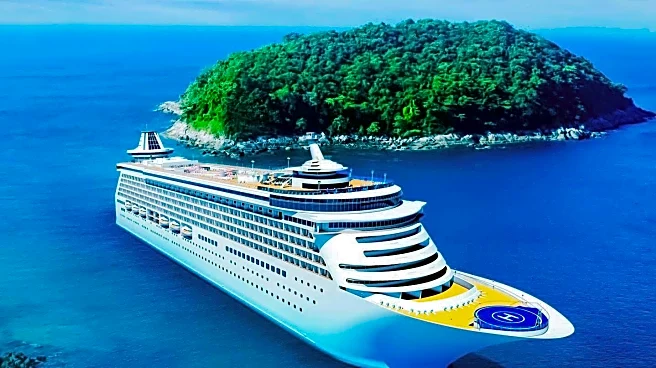What's Happening?
In September 2025, nearly 100 passengers aboard the Royal Caribbean International's Serenade of the Seas were affected by norovirus, marking the 19th outbreak of gastrointestinal illness on cruise ships this year. Norovirus, a highly contagious virus, is responsible for over 90% of such outbreaks on cruise ships, according to the CDC's Maritime Illness Database and Reporting System. The virus spreads rapidly in crowded environments, such as cruise ships, through direct contact, contaminated food and beverages, or touching infected surfaces. Symptoms include stomach cramps, nausea, vomiting, and diarrhea, typically lasting 48 hours, but individuals can continue to spread the virus for up to two weeks after recovery.
Why It's Important?
The outbreak underscores the persistent challenge of managing norovirus on cruise ships, which are particularly vulnerable due to the close quarters and high passenger turnover. This incident highlights the need for stringent health protocols and effective sanitation measures to prevent the spread of the virus. The economic impact on the cruise industry can be significant, as outbreaks may deter potential passengers, affecting bookings and revenue. Additionally, the health risks posed by norovirus are particularly concerning for vulnerable populations, such as the elderly and immunocompromised individuals, who may experience severe dehydration and complications.
What's Next?
Cruise lines may need to reassess their health and safety protocols to mitigate future outbreaks. This could involve enhanced cleaning procedures, better screening of passengers, and improved communication about health risks. The CDC may also update guidelines for cruise ships to address the ongoing threat of norovirus. Passengers are advised to practice good hygiene, such as frequent handwashing, and to be aware of symptoms to seek timely medical attention if needed.
Beyond the Headlines
The recurring nature of norovirus outbreaks on cruise ships raises questions about the effectiveness of current health measures and the industry's preparedness to handle such incidents. There may be ethical considerations regarding the transparency of cruise lines in reporting outbreaks and their responsibility to protect passengers' health. Long-term, the industry might explore technological solutions, such as advanced air filtration systems, to reduce the spread of airborne viruses.









